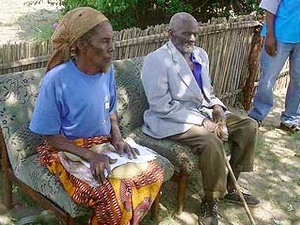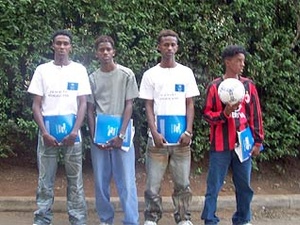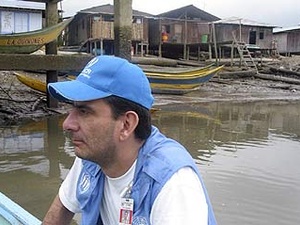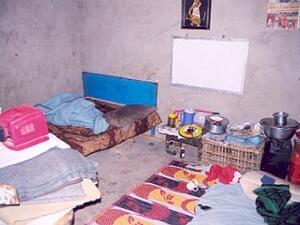Local aid workers in today's Baghdad live a life of hardship and worry
Local aid workers in today's Baghdad live a life of hardship and worry

UNHCR national staff outside the agency's Baghdad office.
BAGHDAD, Iraq (UNHCR) - "My body is here but my mind is with my family," says Hossein, a driver in UNHCR's Baghdad office. Hossein is one of thousands of local UN workers who daily brave considerable risks in present-day Iraq while fretting about their families.
International aid officials say it takes a lot of dedication and commitment nowadays for anyone in Baghdad to focus on issues at hand while constantly worrying about loved ones. Residents of the Iraqi capital lack regular supplies of water and electricity. Some stay up through the night to defend their property from looters.
In Iraq, the UN refugee agency's local staff have been through particularly tough times over the past few months, braving bombs, insecurity and lack of basic services in a country that some UN officials describe as "suspended between war and peace."
During the air war, UNHCR staff somehow managed to look after the agency's office in the Masbah District of Baghdad. And even though the premises were eventually looted, it was again UNHCR's local staff who helped restart the agency's work in record time. "We lost all our equipment in Baghdad, but our biggest asset is still there," said UNHCR representative Daniel Bellamy, referring to UNHCR's local staff.
Like most residents of Baghdad, UNHCR staff arrive at the office drained and tired. Dark circles under their eyes are telltale signs of worry and lack of sleep. Much of the time there is no electricity in the Iraqi capital, meaning no air conditioning. The stifling, nearly-50 degree heat hardly subsides during the night, making sleep almost impossible.
At the office, UNHCR's workers often chat over their noontime meal about the challenges they face looking after themselves and their families. Here, at least they can get a respite from the punishing heat of Baghdad, thanks to generator-powered air conditioning and running water.
Since the war ended, their daily lives have changed dramatically. People in Baghdad cannot cook proper meals, as cooking gas cylinders are hard to come by. They cannot store anything either, as frequent power cuts have rendered refrigerators useless. Residents of the capital must buy fresh food on the market every day and prepare it immediately.
While at work, UNHCR staff never stop agonizing over the situation back home. Did the children get to school and back safely? Is my wife okay? What about the elderly parents who stayed behind unprotected?
Moving around is also a problem in a vast city where walking is dangerous. Baghdad's public transport network collapsed during the war, and fuel shortages cause long lines at gas stations. But the refugee agency's workers still manage to arrive at the office on time, or even early.
Lack of transportation and general insecurity turn daily chores like shopping or going to the doctor's into a major ordeal. Since telephones do not work, looking after relatives or friends means actually going to their homes to check on them - also a risky venture in Baghdad.
By Melita H. Sunjic
UNHCR Baghdad







